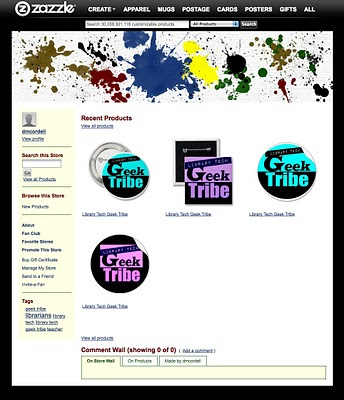who share a common ancestry and culture and among whom leadership is typically neither formalized nor permanent... A group of people sharing an occupation, interest or habit.
Due to copyright issues (about which librarians are VERY serious), we were unable to continue offering Library Tech Geek Squad buttons for sale.
The good news, is that our talented designer, Gwyneth Jones, has created an even better design: we are now the Library Tech Geek Tribe!
Items currently available on Zazzle include Tribe buttons and stickers, with other products in the works.

As before, any profits from the GeekTribe line will be used to help support the Teacher Librarian Ning.
Please visit my Zazzle page for ordering information.
*Bonus!
A week before ALA and ISTE we'll be publishing a copyright free conference badge for new Tribe members to print out and proudly display!